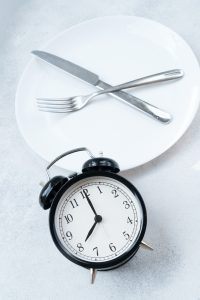If you’re not eating enough, you may be affecting your vision. Learn about the connection between having a poor diet and your vision.
If you’re experiencing a sudden change in your vision, you may be confused about what’s causing it. While there are many factors and potential causes at play, you should not discard your diet as a possible culprit. In fact, the food you eat (or don’t eat) may be causing your blurry vision.
Dieting and Your Vision
 If you’re on a diet that restricts your calories or food too much, you may be affecting your glucose, which then affects your vision. “Glucose is the main source of energy to the brain. When blood sugar drops too low, the brain isn’t getting steady energy and therefore cannot function as normal and may lead to an impairment in vision,” says Erin Palinski-Wade, RD, CDCDS, a registered dietitian and certified diabetes care and education specialist in Sparta, New Jersey.
If you’re on a diet that restricts your calories or food too much, you may be affecting your glucose, which then affects your vision. “Glucose is the main source of energy to the brain. When blood sugar drops too low, the brain isn’t getting steady energy and therefore cannot function as normal and may lead to an impairment in vision,” says Erin Palinski-Wade, RD, CDCDS, a registered dietitian and certified diabetes care and education specialist in Sparta, New Jersey.
Fortunately, this change is only temporary. However, low blood sugar isn’t the only cause of blurred vision. “Dehydration can trigger eye strain, which in turn can lead to tired eyes and blurry vision,” says Palinski-Wade. “Since the brain is made up mostly of water, dehydration can also impair mental function, which in turn can impair vision in a similar way low blood sugar can. This is temporary and restored once hydration is back to a normal level.”
Make sure that you stay hydrated – especially if you’re on a diet. The American Optometric Association recommends drinking 8 to 10 glasses of water per day to avoid dehydration and dry eyes.
Keto and Your Vision
The keto diet is a popular weight-loss plan, but its lack of carbohydrates can affect your glucose and, in turn, your vision. “A keto diet provides very few carbohydrates, the macronutrient easiest to convert into glucose in the body,” explains Palinski-Wade. “When you eat few carbs, your blood sugar can lower as well.”
Palinski-Wade also explains that it’s unlikely to experience blurry vision as a result of following the keto diet. However, research suggests that people with diabetes can experience a high number of hypoglycemic episodes on the diet, so they have to be careful.
Intermittent Fasting
“When you go long periods of time without eating, such as during a fast, the body can drain energy stores and see a drop in blood sugar levels,” says Palinski-Wade. “For most individuals, blood sugar will not drop dangerously low, yet a blood sugar on the low end of normal can make you feel fatigued or shaky or cause mental fogginess.”
 If you experience vision changes after starting a new diet, talk to your doctor. “If the underlying cause is dehydration or low blood sugar, diet should be adjusted to prevent further drops in blood sugar and/or hydration status,” says Palinski-Wade.
If you experience vision changes after starting a new diet, talk to your doctor. “If the underlying cause is dehydration or low blood sugar, diet should be adjusted to prevent further drops in blood sugar and/or hydration status,” says Palinski-Wade.
Lastly, if you need an extra boost, you can always take supplements like Eye & Vision Support. It promotes a stronger cornea, healthy retina, healthy blood vessel growth in the eye, and strength to endure degenerative processes. Give your eye health the support it deserves by eating healthily and taking Eye & Vision Support.

